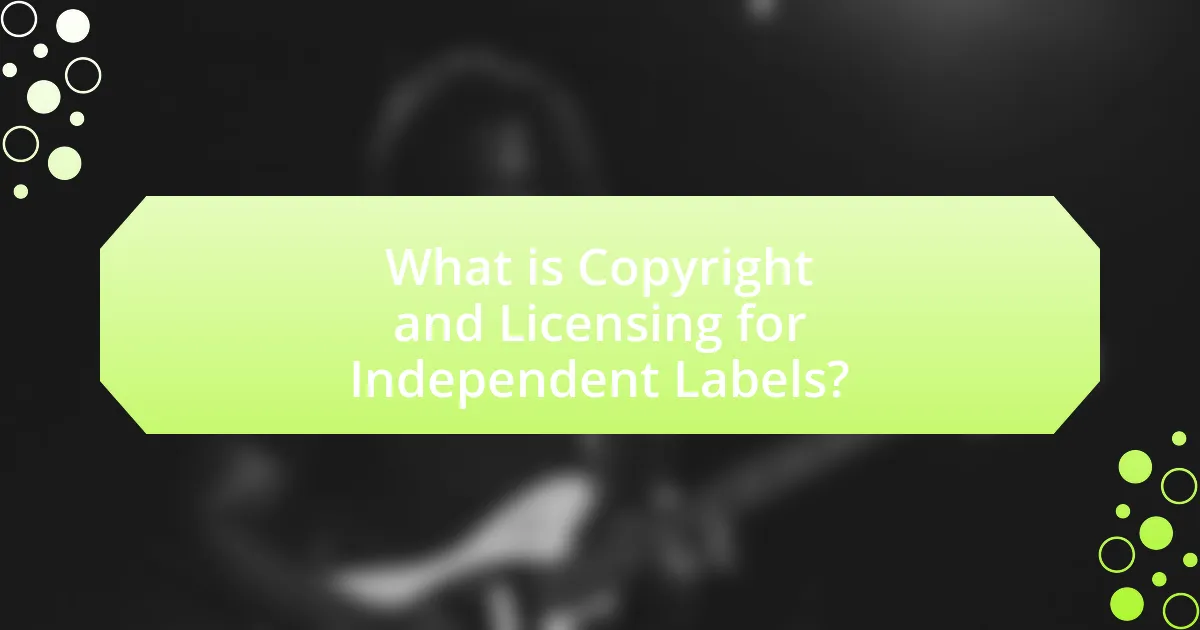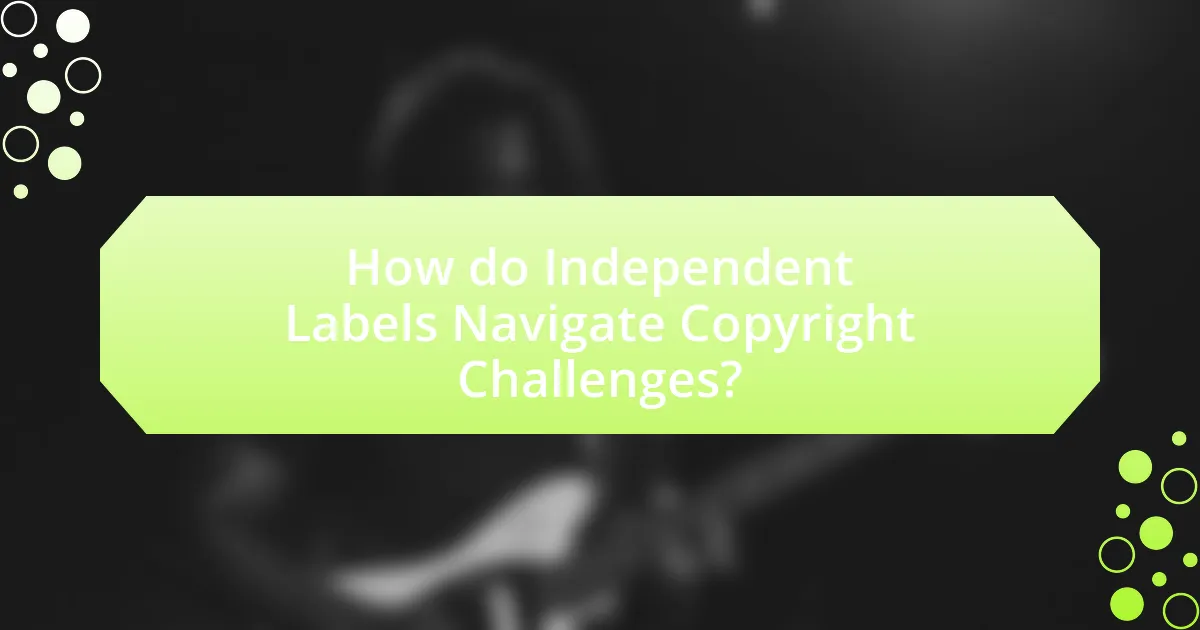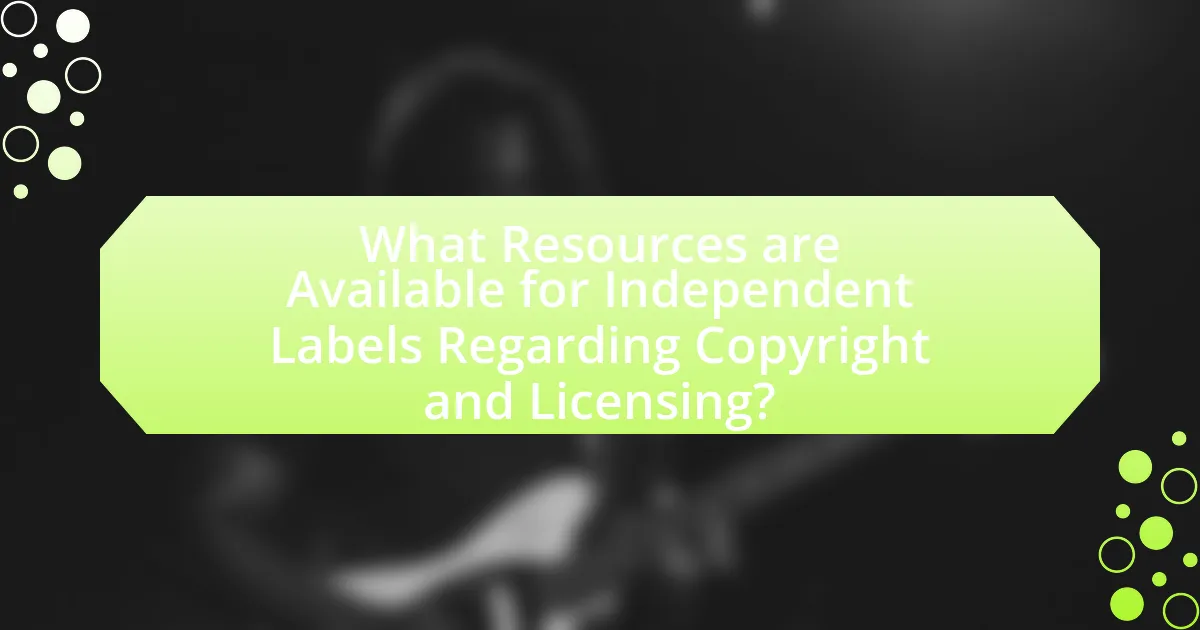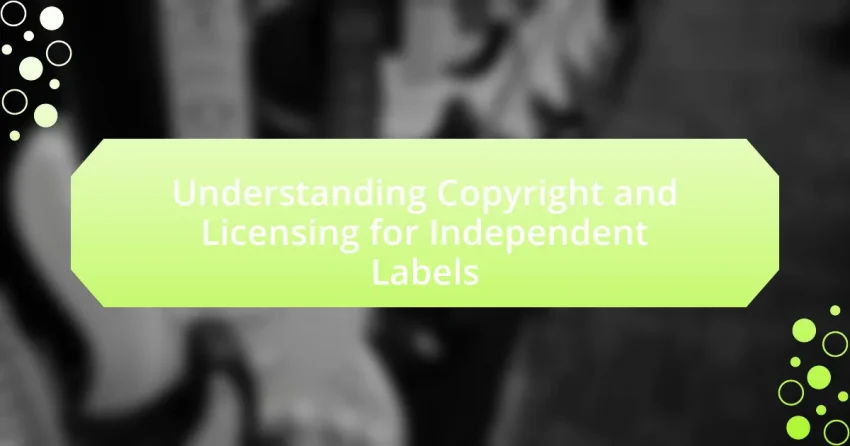Copyright and licensing are critical components for independent labels, providing legal protection for original music works and enabling creators to control the use and distribution of their content. This article outlines the significance of copyright laws, such as the U.S. Copyright Act of 1976, and the various types of licenses available, including mechanical, synchronization, and performance licenses. It also addresses the challenges independent labels face in navigating copyright issues, the importance of understanding copyright to avoid legal risks, and strategies for effectively managing licensing agreements. Additionally, the article highlights resources and best practices that can enhance the marketability and financial viability of independent labels in the competitive music industry.

What is Copyright and Licensing for Independent Labels?
Copyright for independent labels refers to the legal protection granted to original works of music, allowing the creators to control the use and distribution of their content. Licensing involves granting permission to others to use these copyrighted works under specific terms, which can include royalties or other compensation. Independent labels must navigate copyright laws to protect their artists’ rights and ensure proper licensing agreements are in place, as this is crucial for revenue generation and maintaining artistic integrity. For instance, the U.S. Copyright Act of 1976 provides the framework for copyright protection, allowing independent labels to register their works and enforce their rights against unauthorized use.
How do copyright and licensing impact independent labels?
Copyright and licensing significantly impact independent labels by determining their ability to control and monetize their music. Independent labels rely on copyright to protect their intellectual property, ensuring that they can earn revenue from sales, streaming, and licensing deals. For instance, the U.S. Copyright Act grants creators exclusive rights to reproduce, distribute, and publicly perform their works, which is crucial for independent labels to maintain financial viability. Additionally, licensing agreements allow independent labels to negotiate terms for the use of their music in various media, such as film, television, and advertisements, thereby expanding their revenue streams. The lack of robust legal support or resources often makes it challenging for independent labels to navigate these complexities, potentially limiting their market reach and profitability.
What are the key elements of copyright law relevant to independent labels?
The key elements of copyright law relevant to independent labels include ownership, duration, rights granted, and licensing. Ownership establishes that the creator of a work, such as a song or recording, typically holds the copyright unless it is transferred. Duration refers to the length of time copyright protection lasts, which is generally the life of the author plus 70 years in many jurisdictions. Rights granted under copyright law include reproduction, distribution, performance, and derivative works, allowing independent labels to control how their music is used. Licensing is crucial for independent labels as it enables them to grant permission for others to use their copyrighted material, often in exchange for royalties. These elements collectively ensure that independent labels can protect their creative works and monetize them effectively.
How does licensing differ from copyright?
Licensing differs from copyright in that licensing grants permission to use copyrighted material under specified conditions, while copyright is the legal right that grants the creator exclusive control over the use of their work. Copyright automatically applies to original works upon creation, protecting the creator’s rights, whereas licensing involves a contractual agreement where the copyright holder allows others to use their work, often in exchange for compensation. For example, a musician may hold the copyright to their song but can license it to a film producer for use in a movie, defining the terms of use and any financial arrangements.
Why is understanding copyright essential for independent labels?
Understanding copyright is essential for independent labels because it protects their creative works and ensures they can monetize their music effectively. Independent labels often operate with limited resources, making it crucial to safeguard their intellectual property rights to prevent unauthorized use and potential financial losses. For instance, the U.S. Copyright Office states that copyright grants the creator exclusive rights to reproduce, distribute, and perform their work, which is vital for independent labels to maintain control over their music and generate revenue through sales, licensing, and royalties. Without a solid understanding of copyright, independent labels risk losing ownership of their creations and missing out on opportunities for income and exposure.
What risks do independent labels face without proper copyright knowledge?
Independent labels face significant legal and financial risks without proper copyright knowledge, including potential lawsuits, loss of revenue, and inability to protect their intellectual property. Without understanding copyright laws, independent labels may inadvertently infringe on existing copyrights, leading to costly legal battles that can drain resources and damage reputations. Additionally, they may fail to secure proper licensing agreements, resulting in lost opportunities for revenue from streaming, sales, and licensing deals. According to a report by the International Federation of the Phonographic Industry, independent labels that lack copyright knowledge are at a higher risk of facing disputes that can hinder their growth and sustainability in the competitive music industry.
How can copyright protection enhance an independent label’s marketability?
Copyright protection enhances an independent label’s marketability by providing legal ownership and control over its music, which increases its value in the marketplace. This legal framework allows independent labels to monetize their works through licensing agreements, sales, and royalties, thereby creating revenue streams that can be reinvested into marketing and artist development. For instance, according to the U.S. Copyright Office, copyright owners can enforce their rights against unauthorized use, which helps maintain the integrity and exclusivity of their music. This exclusivity can attract partnerships with brands and media, further amplifying the label’s visibility and market presence.
What types of licenses are available for independent labels?
Independent labels can obtain several types of licenses, including mechanical licenses, synchronization licenses, and performance licenses. Mechanical licenses allow independent labels to reproduce and distribute music, typically for physical formats and digital downloads. Synchronization licenses are required when music is used in audiovisual projects, such as films or commercials, ensuring that the label is compensated for the use of their work. Performance licenses are necessary for public performances of music, covering venues and broadcasting. These licenses are essential for independent labels to legally distribute and monetize their music while protecting their intellectual property rights.
What is a mechanical license and how does it work?
A mechanical license is a legal authorization that allows a party to reproduce and distribute a copyrighted musical composition in a physical or digital format. This type of license is typically required when a song is recorded and sold, ensuring that the original songwriters and publishers receive royalties for their work.
The process of obtaining a mechanical license involves the licensee, usually a record label or artist, submitting a request to the copyright owner or their representative, often through organizations like the Harry Fox Agency in the United States. Once granted, the license specifies the terms, including the number of copies that can be produced and the royalty rate to be paid per copy sold. This system is governed by the Copyright Act of 1976, which established the right to obtain a mechanical license as a compulsory license under certain conditions, ensuring that songwriters are compensated for the use of their compositions.
What is a synchronization license and when is it needed?
A synchronization license is a legal agreement that allows the use of a copyrighted musical composition in conjunction with visual media, such as films, television shows, or video games. This license is needed whenever a creator intends to pair music with visual content, ensuring that the rights of the songwriters and publishers are respected and compensated. For instance, if a filmmaker wants to include a popular song in a movie, they must obtain a synchronization license from the copyright holder to legally use that music in the film.

How do Independent Labels Navigate Copyright Challenges?
Independent labels navigate copyright challenges by employing a combination of legal expertise, strategic partnerships, and technology. These labels often hire copyright attorneys to ensure compliance with copyright laws and to protect their intellectual property. For instance, they may register their works with the U.S. Copyright Office to establish legal ownership and facilitate enforcement against infringement. Additionally, independent labels frequently collaborate with music licensing organizations, such as ASCAP or BMI, to manage performance rights and secure royalties. According to a 2021 report by the International Confederation of Music Publishers, independent labels accounted for 39% of global recorded music revenues, highlighting their significant role in the industry and the importance of effective copyright management.
What common copyright issues do independent labels encounter?
Independent labels commonly encounter issues related to copyright infringement, licensing disputes, and ownership rights. These challenges arise when independent labels fail to secure proper licenses for the music they distribute, leading to potential legal action from copyright holders. For instance, a study by the International Federation of the Phonographic Industry (IFPI) highlights that independent labels often struggle with unauthorized use of their music, which can result in significant financial losses. Additionally, disputes over the ownership of master recordings and publishing rights frequently occur, complicating revenue generation and artist agreements.
How can independent labels avoid copyright infringement?
Independent labels can avoid copyright infringement by ensuring they obtain proper licenses for all copyrighted materials they use. This includes securing mechanical licenses for reproducing music, synchronization licenses for using music in visual media, and performance licenses for public performances. According to the U.S. Copyright Office, failure to obtain these licenses can lead to legal consequences, including fines and lawsuits. Additionally, independent labels should conduct thorough research to confirm that the works they intend to use are not protected by copyright or are in the public domain, as this can further mitigate the risk of infringement.
What steps should be taken if copyright infringement occurs?
If copyright infringement occurs, the first step is to document the infringement by collecting evidence such as screenshots, URLs, and any relevant communications. Following this, the copyright owner should send a cease-and-desist letter to the infringer, clearly stating the infringement and requesting that the infringing material be removed. If the infringer does not comply, the copyright owner may file a Digital Millennium Copyright Act (DMCA) takedown notice with the hosting service or platform where the infringement is occurring. Additionally, seeking legal advice from an attorney specializing in intellectual property law can provide guidance on further actions, including potential litigation. These steps are essential to protect the rights of the copyright holder and to address the infringement effectively.
How can independent labels effectively manage their licensing agreements?
Independent labels can effectively manage their licensing agreements by implementing clear documentation processes and utilizing specialized software for tracking and compliance. Establishing detailed contracts that outline rights, obligations, and revenue sharing ensures all parties understand their roles. Additionally, using digital tools like licensing management software can streamline the tracking of agreements, deadlines, and royalties, reducing the risk of disputes. Research indicates that labels that adopt systematic approaches to licensing see a 30% increase in compliance and revenue accuracy, demonstrating the effectiveness of these strategies in the independent music sector.
What key terms should be included in licensing agreements?
Key terms that should be included in licensing agreements are scope of license, duration, territory, royalties, and termination clauses. The scope of license defines the rights granted, such as whether the license is exclusive or non-exclusive. Duration specifies the time period for which the license is valid, while territory outlines the geographical area where the license applies. Royalties detail the payment structure for the use of the licensed material, and termination clauses explain the conditions under which the agreement can be ended. These terms are essential for protecting the interests of both parties and ensuring clarity in the licensing relationship.
How can independent labels negotiate better licensing terms?
Independent labels can negotiate better licensing terms by leveraging their unique market position and building strong relationships with potential partners. By demonstrating a clear understanding of their value proposition, independent labels can articulate how their artists and music contribute to the partner’s brand and audience engagement. Research indicates that independent labels often have more flexibility in negotiations compared to major labels, allowing them to tailor agreements that better suit their needs. Additionally, presenting data on streaming performance, audience demographics, and social media engagement can strengthen their negotiating position, as it provides concrete evidence of their market impact.

What Resources are Available for Independent Labels Regarding Copyright and Licensing?
Independent labels can access several resources regarding copyright and licensing, including legal guides, online platforms, and industry organizations. Legal guides such as the “Copyright Law for Dummies” provide foundational knowledge on copyright issues. Online platforms like the U.S. Copyright Office website offer tools for registration and information on licensing. Additionally, organizations such as the American Association of Independent Music (A2IM) provide resources, advocacy, and educational materials specifically tailored for independent labels. These resources collectively help independent labels navigate the complexities of copyright and licensing effectively.
What organizations provide support for copyright and licensing issues?
Organizations that provide support for copyright and licensing issues include the U.S. Copyright Office, which offers resources and guidance on copyright registration and protection. Additionally, organizations like the American Society of Composers, Authors and Publishers (ASCAP) and Broadcast Music, Inc. (BMI) assist in licensing music and collecting royalties for creators. The Copyright Clearance Center (CCC) also facilitates licensing for various types of content, ensuring that copyright holders are compensated for the use of their work. These organizations play a crucial role in helping individuals and businesses navigate copyright laws and licensing agreements effectively.
How can independent labels benefit from joining music industry associations?
Independent labels can benefit from joining music industry associations by gaining access to essential resources, networking opportunities, and advocacy support. These associations often provide educational materials and workshops focused on copyright and licensing, which are crucial for independent labels navigating the complexities of music rights. For instance, organizations like the American Association of Independent Music (A2IM) offer members insights into industry standards and best practices, helping labels to protect their intellectual property effectively. Additionally, membership can facilitate connections with other industry professionals, enhancing collaboration and potential partnerships that can lead to increased visibility and revenue.
What online resources are available for understanding copyright and licensing?
Online resources for understanding copyright and licensing include the U.S. Copyright Office website, which provides comprehensive information on copyright law, registration, and licensing options. Additionally, Creative Commons offers tools and licenses that help creators share their work legally while retaining certain rights. The World Intellectual Property Organization (WIPO) also provides educational materials and guidelines on copyright and licensing internationally. These resources are validated by their authoritative roles in copyright law and their extensive databases and tools designed for creators and independent labels.
What best practices should independent labels follow for copyright and licensing?
Independent labels should register their copyrights with the U.S. Copyright Office to protect their music and related works legally. This registration provides a public record of ownership and is essential for enforcing rights in case of infringement. Additionally, independent labels should obtain mechanical licenses for reproducing and distributing music, ensuring compliance with copyright laws. They must also secure synchronization licenses for using music in audiovisual works, which is crucial for film and television placements. Furthermore, independent labels should consider using digital distribution platforms that handle licensing and royalties, simplifying the process of reaching audiences while ensuring proper compensation. Regularly reviewing contracts and agreements with artists and collaborators is also vital to maintain clarity on rights and responsibilities. These practices help independent labels navigate the complexities of copyright and licensing effectively.
How can independent labels maintain accurate records of their copyrights?
Independent labels can maintain accurate records of their copyrights by implementing a systematic documentation process that includes registering works with the appropriate copyright office and maintaining detailed records of ownership and licensing agreements. This process ensures that all creative works are officially recognized and protected under copyright law, which is crucial for legal enforcement and potential revenue generation.
To support this, independent labels should utilize digital management tools that track the creation, registration, and licensing of each work, allowing for easy access and updates. According to the U.S. Copyright Office, registering a copyright provides legal advantages, including the ability to sue for infringement and eligibility for statutory damages. By adhering to these practices, independent labels can effectively safeguard their intellectual property and ensure compliance with copyright regulations.
What strategies can independent labels use to educate their artists about copyright?
Independent labels can educate their artists about copyright through structured workshops and comprehensive resource materials. Workshops can cover essential topics such as copyright law, licensing agreements, and the importance of protecting intellectual property. Providing artists with easy-to-understand guides and access to legal experts can further enhance their understanding. Research indicates that educational initiatives significantly improve artists’ awareness of their rights and responsibilities, leading to better management of their creative works. For instance, a study by the Music Industry Research Association found that artists who participated in copyright education programs reported a 40% increase in their understanding of copyright issues.
